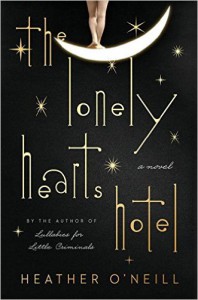

Set in the early part of the 20th century, between the first and second World War, this novel is part love story, part feminist novel. It also sometimes feels like a fairy tale with parts of the story told in such a lyrical way, there should be a musical accompaniment.
In the winter of 1914 in Montreal, two babies are abandoned by their teenage mothers and end up in the same orphanage. Rose and Pierrot are both gifted entertainers and from a young age, use their talents to captivate their fellow orphans. Eventually, people outside the orphanage notice their talent and Rose and Pierrot are paraded through the parlours of the rich to generate funds for the orphanage. Not unexpectedly, none of the funds actually benefit the orphans but rather make the nuns’ lives - a cruel and perverse group - more comfortable.
Separated as teenagers, Rose finds herself sent to a rich home as a tutor for unruly children. Little do the parents know that Rose is not much better than an unruly child herself. Pierrot also finds himself in a rich household as a companion to an eccentric and elderly man who is estranged from his family. While neither situation teach Rose and Pierrot the skills they need to support themselves in depression-era Montreal, it becomes evident quickly that Rose is the pragmatic survivor while Pierrot remains the whimsical artist.
Reconnecting again as adults, Rose and Pierrot renew their love for each other and for the talent and quirkiness that connected them as young children. They work together to build a life and to make their childhood dream of becoming stage performers come true. The story is heart breaking and gritty, with even the happiest of moments shadowed by the harshness life at that time.
The writing in this book is wonderful. Experiences that I have never - in many cases, thankfully - had in my life are made so real through Heather O’Neill’s unique use of words.
A train trip to New York is described as follows:
“They went through a series of old, crotchety mountains. They were so old they didn’t look dangerous anymore. Occasionally a big boulder rolled off them into the middle of a road or landed on top of a deer, but on the whole they had found their place in the world. The rain had worn their peaks down, one argument at a time.”
This story makes a particularly moving statement on women and the struggles they face daily simply to be respected.
“Men were taught to have so much pride, to go out into the world and make something of themselves. This Depression was deeply humiliating. Since women were taught that they were worthless, they took poverty and hardship less personally.”
Or even more of a direct statement that as a woman,
“You were often only an ethical question away from being a prostitute.”
If I have a criticism of the story, I did find that it took a frustratingly long time for Rose and Pierrot to reconnect as adults. I understand that building suspense is necessary however, I felt that I had to suspend disbelief in order to accept the number of times that Rose and Pierrot crossed paths but didn’t actually meet each other. At one point, Pierrot exited by the front door of a room while Rose was entering through the back door.
That said, this book is simply captivating. It was difficult to climb out of the story and go back to regular life - I so desperately wanted Rose and Pierrot to escape the orphanage, find each other again, become rich and successful and live happily ever after! This book is a more realistic than that of course but you won’t be able to stop rooting for Rose and Pierrot.






